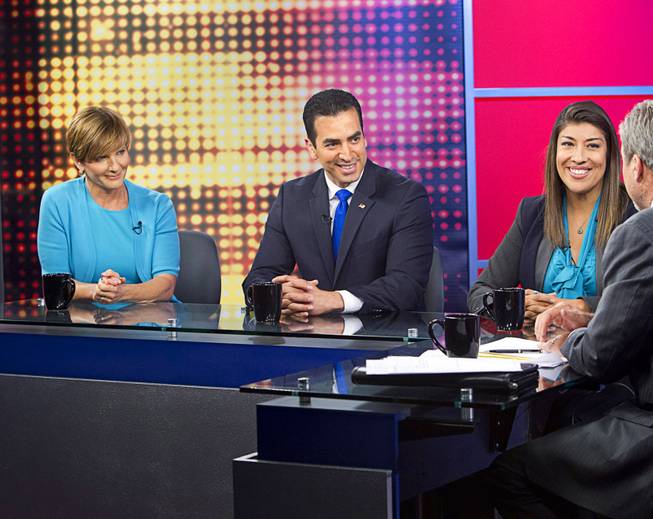
Democratic congressional candidates Susie Lee, Ruben Kihuen and Lucy Flores appear with host Jon Ralston during a taping of “Ralston Live” on Wednesday, June 8, 2016, at Vegas PBS.
Friday, June 10, 2016 | 2 a.m.
The night Steven Horsford was ousted from his seat in the U.S. House of Representatives by then little-known Republican Assemblyman Cresent Hardy came as a bitter shock to Democrats.
Horsford had seemingly played his cards right in his 2014 re-election bid to Nevada’s 4th Congressional District. Meanwhile, Hardy had made a number of gaffes during the campaign cycle and was largely written off by pundits as a long-shot candidate.
But two weeks before the election, amid early voting, a super PAC tied to Republican strategist Karl Rove put up $1 million against Horsford after sensing the party might actually have a shot in the district. That — coupled with Hardy’s boots-on-the-ground effort, a less than excited Democratic electorate who failed to turn out, and the red tide that rolled across the nation that cycle — was enough to sweep Hardy into office, the Sun reported at the time.
And Hardy wasn’t the only Republican who won in 2014. Republicans took control of both houses of the state Legislature and swept all six of the top state offices to boot.
Lesson learned, Democrats have said.
Two years later they've dusted themselves off and are seeking vindication. And perhaps one of the sweetest forms for Democrats would be ousting Hardy.
As far as districts go, Nevada’s 4th is still relatively nascent: Horsford became its first representative in 2013 and Hardy its second in 2015. Democrats currently outnumber Republicans in the district by about 33,000.
When Horsford made clear he wouldn’t be running last spring, the question was who would carry the banner of the Democratic Party in the district, which covers the northern portion of Clark County as well as part of Lyon County and all of Esmeralda, Lincoln, Mineral, Nye and White Pine counties.
A bevy of names were floated by Democrats at the time, including state Sen. Pat Spearman, state Sen. Kelvin Atkinson, and North Las Vegas Mayor John Lee. Ultimately, three viable contenders emerged: former state Assemblywoman Lucy Flores, state Sen. Ruben Kihuen and philanthropist Susie Lee. (Former Assembly Speaker John Oceguera was also in the race for several months, but dropped out in mid-March.)
They’re not the only candidates in the Democratic primary. Morse Arberry, Brandon Casutt, Dan Rolle, Mike Schaefer and Rodney Smith are also running.
But like it takes a village to raise a child, it takes a coordinated campaign effort, months of outreach to voters, and hundreds of thousands of dollars to get the votes needed to win a congressional primary, and Flores, Kihuen and Lee are considered by political observers to be the only candidates who have done just that. They are very much focused on defeating each other come Tuesday, but it is with Hardy in mind that they hope to press on to November's general election.
They’ve been campaigning for months, but this week the candidates were out under an unrelenting summer sun, sweating through triple-digit heat in the hope of shoring up votes from their possible future constituents. Despite spending considerable sums on television advertisements and mailers sent out across the district, each of them will tell you there’s nothing like a strong ground game.
• • •
On the manicured, palm-lined streets of Sun City Summerlin, Kihuen made another attempt Monday afternoon to reach seasoned voters he hadn’t managed to catch in January. He said that when he started canvassing at the beginning of the year, no one knew who he was. He has been in politics for 10 years — first as a state assemblyman and now as state senator — but legislators often have little name recognition.
Polling showed the same thing: a February poll by Public Policy Polling showed Flores in the lead with 29 percent support, 9 percent for Lee, 7 percent for Oceguera and 6 percent for Kihuen. Though Flores is a former assemblywoman, a 2014 run for lieutenant governor had given her name recognition across the state.
“At first, people had no idea who I was, so it was just a general introduction,” Kihuen said. “Now they say, ‘Hey, you’re the guy that Sen. (Harry) Reid and Bill Clinton are endorsing.’”
One woman whose door Kihuen knocked on Monday afternoon said something to that effect, telling him she'd heard “nothing but good things.”
Kihuen isn’t shy about sharing his endorsements. Reid endorsed his campaign in September, and Kihuen’s first television ad was narrated almost entirely by the veteran senator. When Clinton’s endorsement came a couple of weeks ago, it became a focal point of a second ad.
He also has the backing of several prominent labor unions, including the Culinary Union, SEIU Local 1107, and the Nevada State AFL-CIO. Campaign-finance records show that the Culinary Union’s parent union has contributed about $230,000 to Kihuen's TV ad production/air time and mailers, and that SEIU has given about $13,000 in staff time and other expenses. The unions are also devoting significant volunteer hours to phone-banking and canvassing efforts on Kihuen’s behalf. All of that helps to balance out the fact that he’s raised the least out of his opponents, about $930,000 in total contributions.
But those are the kinds of details that don’t come up at the door.
• • •
Just around the corner from Cheyenne High School in North Las Vegas, Flores was out in the brutal heat on Tuesday afternoon with her niece Vivian.
She knocked on one door and talked to a woman who said she hadn’t decided who to vote for, but it was between Flores and Kihuen. Flores shared her story — how her mother left when she was little, that she fell in with the wrong crowd and ended up in juvenile detention, but then got her GED, went to college, became a lawyer and then a state legislator. A few minutes later, the woman told Flores she could count on her vote, her husband’s vote and her daughter’s vote.
Flores has framed herself as the most progressive of the candidates, but it didn't come up in any of her conversations that afternoon. She endorsed Bernie Sanders for president and has received the endorsements of several notable progressive groups, including Planned Parenthood and NARAL. Planned Parenthood has spent about $2,000 in staff time and printing expenses for door hangers in Flores’ race so far.
Notably, Flores was snubbed by EMILY’s List, which helps pro-choice Democratic women get elected. The group had endorsed her in her bid for lieutenant governor, but this time chose Lee. She also wasn’t endorsed by Reid, who had seen promise in her two years ago as well. “Demographically, she’s perfect: Young, dynamic, Hispanic,” Reid said at the time.
Flores is thankful for her endorsements, but downplayed their importance at the door. “When you take away the fancy endorsements and advertisements and mailers, I’m the most effective legislator on the ticket and who works the hardest,” she told one resident.
Flores is also thankful for the support she’s received from Sanders, who sent out several fundraising solicitations on her behalf, bringing hundreds of thousands of dollars to her campaign. Early in the race, Flores trailed in the fundraising game — one of the reasons EMILY’s List cited in not endorsing her — but quickly caught up to have the second-highest fundraising total in the primary, $985,000.
“It’s been liberating,” Flores said of the Sanders money pitches. “I don’t have to be locked up in a room making fundraising calls, and I have no indebtedness or allegiance to anyone but voters.”
• • •
On a Thursday morning, Lee made her rounds in the neighborhood around West Preparatory Academy in Las Vegas. Walking between the tight houses, she noted that West Prep is one of the schools served by Communities in Schools of Nevada, a nonprofit Lee chairs that helps at-risk students.
She spent several minutes listening to Jenice Evans, who told Lee that she used to be a lab assistant but has been out of work for years and finally stopped looking earlier this year. Lee asked if she had any children at West Prep, and Evans said yes, adding that she recently had to transfer her daughter out because of bullying she experienced. By the time they were done talking, Evans promised that Lee would have votes from her and her mother.
Lee said that, as a first-time congressional candidate, one of the biggest things that surprised her is the fundraising aspect. “Anyone who runs for Congress will tell you raising money is absurd,” Lee said.
She has come under fire for her wealth, including the fact that she has loaned her campaign $300,000, plus an additional $23,000 spent on its trappings. The Culinary Union raised questions over Lee’s investments in Walmart, Halliburton and other companies, which were part of a larger investment portfolio and made without her knowledge.
That’s why Lee says that knocking on doors is important. She recalled a time when her brother-in-law was out canvassing and someone said they had just received a robocall about her Halliburton investment.
“He had to explain that it was part of a fund and blah blah,” Lee said. “The conversations are really important.”
Lee has had the most money to work with in her campaign, $1.29 million, including her contributions. Without them, she’d be closer to Flores and Kihuen in terms of overall fundraising numbers.
But Lee isn't focused on the money. Everything comes down to how she can help people. When she knocked on the door of a man who told her, “I can’t vote, I had my rights taken away,” she took his phone number down and said she'd text him information about an event that weekend that would connect him with resources and help him restore his voting rights.
She acknowledges that she met the woman in charge of the event through her campaign, but adds it’s the kind of thing she might be doing ordinarily in her philanthropy work.
“We’re out working as hard as we possibly can,” Lee said. “But people in CD4 are struggling to get ahead.”
• • •
No one knows what is going to happen come Tuesday. But the candidates all generally acknowledge that the differences between them are relatively minute.
“If you look at most issues, we’re aligned,” Kihuen said. “I think it comes down to who’s best to take on Cresent Hardy in the general election.”
Kihuen and Flores both tout their legislative experience. Kihuen talks about his continued fight for a $15 minimum wage (including introducing a bill to that effect last session), how he supported Sen. Spearman’s bill for equal pay for women, and also how he is the longest-serving legislator in the race.
“Ten years has prepared me to go and represent them,” Kihuen said.
Flores frequently refers to herself as the most “effective legislator,” pointing to her work in passing a domestic-violence prevention law and changing the way kids test out of high school.
“I think everyone is a great candidate and are good people who have decent and influential endorsements,” Flores said. “It’ll be the person who is out in the community the most. I think that will determine the outcome of the race. They want the person who is going to work the hardest for them.”
Lee, meanwhile, has attacked Kihuen and Flores as “career politicians.” Her first television ad featured her walking among cardboard cutouts that say “empty suit,” “all about me” and “running again.”
All of the candidates support a $15 minimum wage, expanding Social Security and making higher education more affordable. But they have their minor points of difference.
Flores supports a single-payer health care system, like the one Sanders has proposed, while Lee and Kihuen support an expansion of the Affordable Care Act. Flores and Kihuen both supported the Iran nuclear deal, while Lee says she would’ve opposed it, though she doesn’t support repealing it now. Flores has also suggested that college should be free for all, while Kihuen said he supports making two-year college free and Lee says that expanding Pell Grants and reducing the cost of higher education should be the priority.
But looking at the broad strokes, the candidates have much in common. That means everything will come down to how well they have been getting their supporters out to vote over the past two weeks of early voting, which ends Friday, and how well they can drive their last wave to the polls on Tuesday.
Whoever does that best will then set sights on November and, more firmly, on Hardy as they seek to take back the seat for the Democrats, proving they have what it takes to create a vastly different outcome for their party than they saw two years ago.




Join the Discussion:
Check this out for a full explanation of our conversion to the LiveFyre commenting system and instructions on how to sign up for an account.
Full comments policy